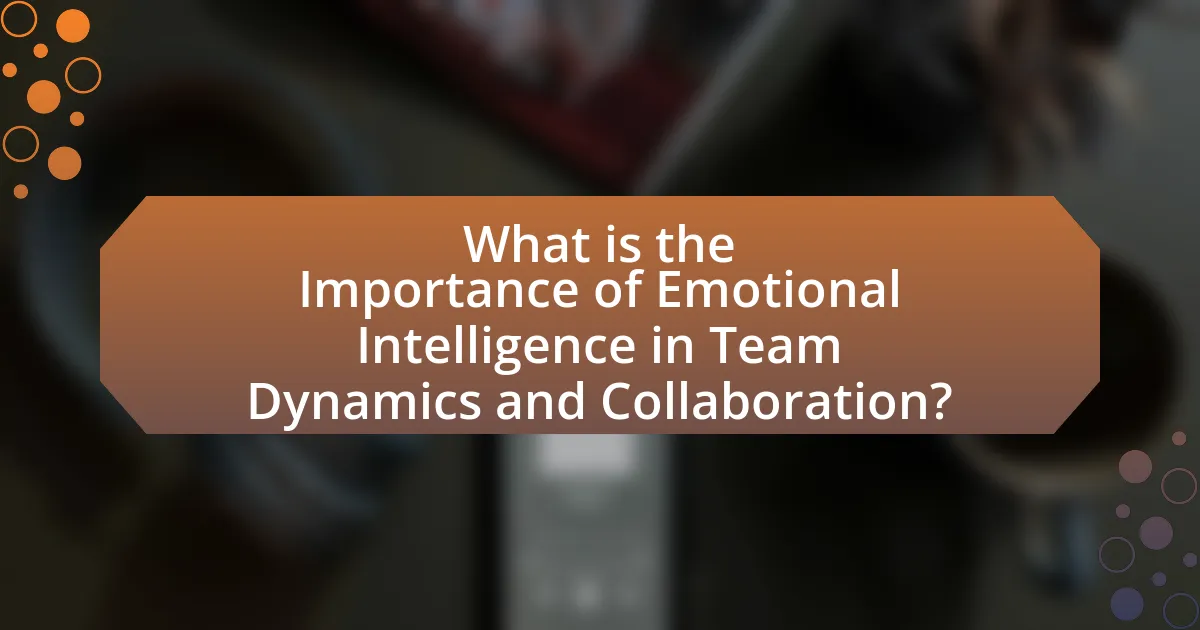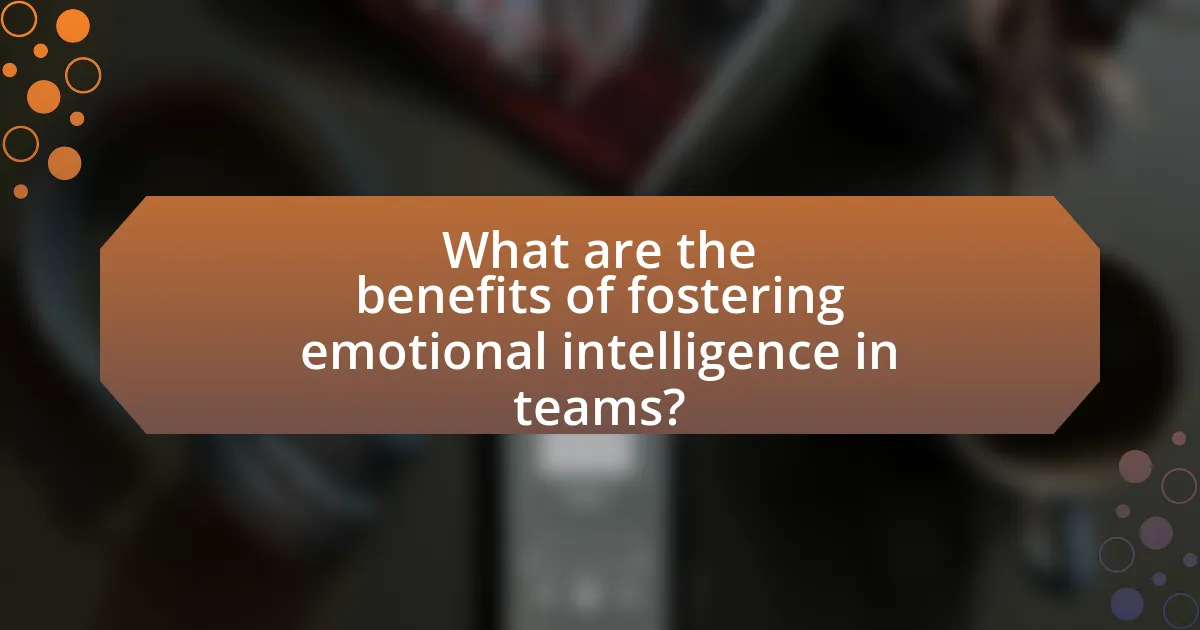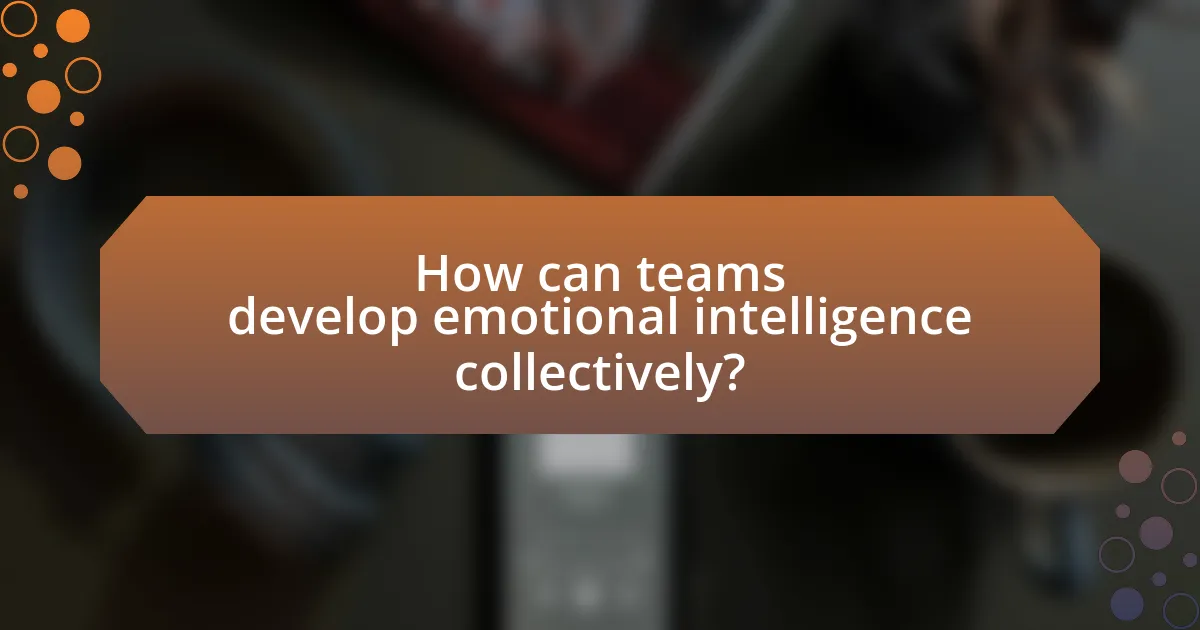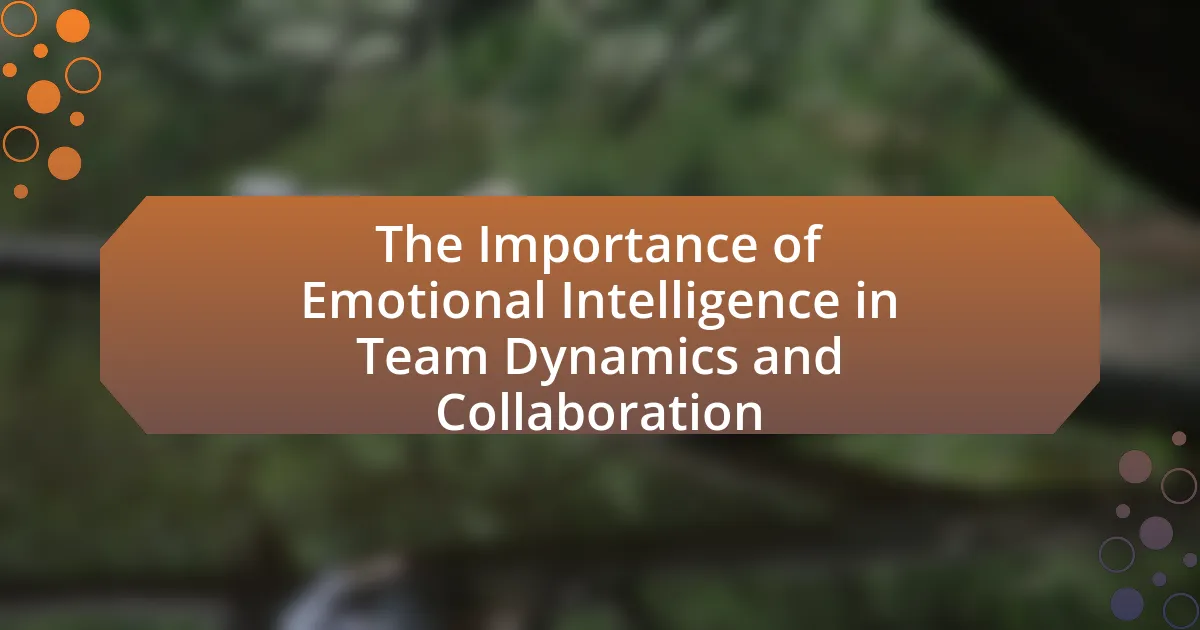Emotional intelligence is a critical factor in enhancing team dynamics and collaboration, significantly impacting communication, trust, and conflict resolution. Teams with high emotional intelligence demonstrate improved interpersonal relationships, leading to increased productivity and effective problem-solving. Key components of emotional intelligence, including self-awareness, empathy, and relationship management, contribute to better communication and a supportive team environment. Research indicates that fostering emotional intelligence within teams results in measurable benefits such as higher performance metrics, reduced turnover, and improved morale, ultimately driving organizational success.

What is the Importance of Emotional Intelligence in Team Dynamics and Collaboration?
Emotional intelligence is crucial in team dynamics and collaboration as it enhances communication, fosters trust, and improves conflict resolution. Teams with high emotional intelligence demonstrate better interpersonal relationships, leading to increased collaboration and productivity. Research by the Consortium for Research on Emotional Intelligence in Organizations indicates that emotionally intelligent teams are more effective, as they can navigate social complexities and manage emotions constructively. This ability to understand and regulate emotions contributes to a positive team environment, ultimately driving better performance and achieving collective goals.
How does emotional intelligence influence team interactions?
Emotional intelligence significantly enhances team interactions by fostering better communication, collaboration, and conflict resolution. Teams with high emotional intelligence exhibit improved understanding of each member’s emotions, leading to more effective interpersonal relationships. Research by Dr. Daniel Goleman indicates that teams with higher emotional intelligence are 20% more productive, as they can navigate social complexities and manage stress more effectively. This ability to empathize and respond to emotional cues allows team members to build trust and create a supportive environment, ultimately leading to increased engagement and performance.
What are the key components of emotional intelligence in a team setting?
The key components of emotional intelligence in a team setting are self-awareness, self-regulation, social awareness, and relationship management. Self-awareness allows team members to recognize their own emotions and how they affect their behavior, which fosters better communication and understanding. Self-regulation enables individuals to manage their emotions, leading to more thoughtful responses rather than impulsive reactions. Social awareness involves the ability to empathize with others, enhancing collaboration and conflict resolution. Relationship management encompasses the skills needed to inspire, influence, and develop others, which is crucial for maintaining a positive team dynamic. Research by Goleman (1995) highlights that teams with high emotional intelligence demonstrate improved performance and collaboration, validating the importance of these components in achieving team success.
How do these components enhance communication among team members?
Components of emotional intelligence, such as self-awareness, empathy, and effective communication skills, enhance communication among team members by fostering understanding and collaboration. Self-awareness allows individuals to recognize their own emotions and how they affect interactions, leading to more thoughtful responses. Empathy enables team members to understand and relate to each other’s feelings, which builds trust and rapport. Effective communication skills facilitate clear expression of ideas and concerns, reducing misunderstandings. Research by Goleman (1995) in “Emotional Intelligence” highlights that teams with high emotional intelligence demonstrate improved collaboration and conflict resolution, ultimately enhancing overall team performance.
Why is emotional intelligence crucial for effective collaboration?
Emotional intelligence is crucial for effective collaboration because it enhances interpersonal relationships and communication among team members. High emotional intelligence allows individuals to recognize and manage their own emotions while also empathizing with others, leading to improved conflict resolution and cooperation. Research indicates that teams with high emotional intelligence demonstrate better performance and satisfaction, as they can navigate social complexities and foster a supportive environment. For instance, a study published in the Journal of Organizational Behavior found that emotional intelligence significantly correlates with team effectiveness, highlighting its role in facilitating collaboration and achieving common goals.
What role does empathy play in team dynamics?
Empathy plays a crucial role in team dynamics by fostering understanding and collaboration among team members. When individuals demonstrate empathy, they are better able to recognize and respond to the emotions and perspectives of their colleagues, which enhances communication and reduces conflict. Research indicates that teams with high levels of empathy experience improved cooperation and problem-solving abilities, leading to increased overall performance. For instance, a study published in the Journal of Applied Psychology found that teams exhibiting strong empathetic behaviors achieved higher levels of trust and satisfaction, which directly correlated with their effectiveness in achieving goals.
How does emotional intelligence contribute to conflict resolution?
Emotional intelligence contributes to conflict resolution by enabling individuals to recognize, understand, and manage their own emotions as well as the emotions of others. This awareness facilitates effective communication, allowing parties in conflict to express their feelings and concerns constructively. Research indicates that teams with high emotional intelligence experience 20% less conflict, as members are better equipped to empathize with differing perspectives and negotiate solutions collaboratively. By fostering an environment of trust and open dialogue, emotional intelligence significantly enhances the likelihood of reaching mutually beneficial resolutions.

What are the benefits of fostering emotional intelligence in teams?
Fostering emotional intelligence in teams enhances collaboration, communication, and overall team performance. Teams with high emotional intelligence demonstrate improved conflict resolution skills, leading to a more harmonious work environment. Research indicates that organizations with emotionally intelligent teams experience a 20% increase in productivity and a 30% reduction in employee turnover, as emotionally intelligent individuals are better equipped to understand and manage their own emotions and those of others. This results in stronger relationships, increased trust, and a more engaged workforce, ultimately driving better business outcomes.
How does emotional intelligence improve team performance?
Emotional intelligence improves team performance by enhancing communication, collaboration, and conflict resolution among team members. Teams with high emotional intelligence exhibit better understanding of each other’s emotions, leading to more effective interactions and a supportive work environment. Research by the Consortium for Research on Emotional Intelligence in Organizations indicates that emotionally intelligent teams are 20% more productive and have lower turnover rates. This is because members can empathize with one another, manage stress, and navigate interpersonal dynamics more effectively, ultimately resulting in improved overall team performance.
What measurable outcomes can be linked to high emotional intelligence in teams?
High emotional intelligence in teams is linked to improved collaboration, increased productivity, and enhanced job satisfaction. Teams with high emotional intelligence demonstrate better communication, which leads to fewer conflicts and more effective problem-solving. Research by the Consortium for Research on Emotional Intelligence in Organizations indicates that organizations with emotionally intelligent teams experience a 20% increase in performance metrics and a 30% reduction in employee turnover. These measurable outcomes highlight the significant impact of emotional intelligence on team dynamics and overall organizational success.
How does emotional intelligence affect team morale and motivation?
Emotional intelligence significantly enhances team morale and motivation by fostering better communication and understanding among team members. When individuals possess high emotional intelligence, they can recognize and manage their own emotions as well as empathize with others, leading to a supportive team environment. Research indicates that teams with emotionally intelligent members experience higher levels of trust and collaboration, which directly correlates with increased morale and motivation. For instance, a study published in the Journal of Organizational Behavior found that teams with higher emotional intelligence reported a 20% increase in overall job satisfaction and motivation levels. This demonstrates that emotional intelligence is crucial for creating a positive team dynamic that boosts morale and drives motivation.
What impact does emotional intelligence have on leadership within teams?
Emotional intelligence significantly enhances leadership effectiveness within teams by fostering better communication, collaboration, and conflict resolution. Leaders with high emotional intelligence can recognize and manage their own emotions while also empathizing with team members, which leads to a more cohesive and motivated team environment. Research indicates that teams led by emotionally intelligent leaders experience higher levels of trust and engagement, resulting in improved performance outcomes. For instance, a study published in the Journal of Organizational Behavior found that leaders with strong emotional intelligence positively influenced team dynamics, leading to a 20% increase in team productivity.
How can leaders model emotional intelligence for their teams?
Leaders can model emotional intelligence for their teams by demonstrating self-awareness, empathy, and effective communication. By recognizing their own emotions and how these affect their behavior, leaders set a standard for team members to follow. For instance, when leaders openly discuss their feelings during challenging situations, they encourage team members to express their own emotions, fostering a supportive environment. Additionally, leaders who actively listen and validate team members’ feelings show empathy, which enhances trust and collaboration within the team. Research indicates that teams with emotionally intelligent leaders experience higher engagement and productivity, as emotional intelligence contributes to better conflict resolution and stronger interpersonal relationships.
What strategies can leaders use to develop emotional intelligence in their teams?
Leaders can develop emotional intelligence in their teams by implementing strategies such as fostering open communication, providing training on emotional awareness, and encouraging feedback. Open communication allows team members to express their feelings and concerns, which enhances understanding and empathy among colleagues. Training programs focused on emotional awareness help individuals recognize their own emotions and those of others, leading to improved interpersonal relationships. Encouraging feedback creates a culture of trust and continuous improvement, enabling team members to learn from each other’s emotional responses and behaviors. Research indicates that teams with high emotional intelligence demonstrate better collaboration and performance, as highlighted in the study “Emotional Intelligence and Team Performance: A Review” by Dr. Vanessa Urch Druskat and Dr. Steven B. Wolff, which emphasizes the positive correlation between emotional intelligence and team dynamics.

How can teams develop emotional intelligence collectively?
Teams can develop emotional intelligence collectively by engaging in regular training and open communication practices. Training programs focused on emotional intelligence skills, such as empathy, self-regulation, and social awareness, enhance team members’ abilities to understand and manage their emotions and those of others. Open communication practices, including feedback sessions and active listening exercises, foster an environment where team members feel safe to express their feelings and perspectives. Research indicates that teams with high emotional intelligence demonstrate improved collaboration and performance, as they are better equipped to navigate interpersonal dynamics and resolve conflicts effectively.
What training methods are effective for enhancing emotional intelligence in teams?
Effective training methods for enhancing emotional intelligence in teams include experiential learning, role-playing, and feedback mechanisms. Experiential learning allows team members to engage in real-life scenarios that require emotional awareness and regulation, fostering a deeper understanding of emotional dynamics. Role-playing exercises enable participants to practice empathy and communication skills in a controlled environment, which has been shown to improve interpersonal relationships within teams. Feedback mechanisms, such as peer reviews and coaching sessions, provide opportunities for individuals to reflect on their emotional responses and receive constructive criticism, thereby promoting continuous improvement in emotional intelligence. Research indicates that these methods lead to measurable increases in emotional intelligence, as evidenced by studies showing enhanced team collaboration and reduced conflict in organizations that implement such training programs.
How can team-building activities promote emotional intelligence?
Team-building activities can promote emotional intelligence by fostering interpersonal relationships and enhancing communication skills among team members. These activities create opportunities for individuals to express their emotions, understand others’ feelings, and develop empathy, which are key components of emotional intelligence. Research indicates that engaging in collaborative tasks helps individuals recognize and manage their own emotions while also improving their ability to navigate social complexities within a team. For instance, a study published in the Journal of Organizational Behavior found that teams participating in structured team-building exercises showed significant improvements in emotional awareness and interpersonal skills, leading to better collaboration and performance outcomes.
What role does feedback play in developing emotional intelligence among team members?
Feedback plays a crucial role in developing emotional intelligence among team members by providing insights into their emotional responses and interpersonal interactions. When team members receive constructive feedback, they gain awareness of their emotional triggers and how their behavior affects others, which is essential for emotional regulation and empathy. Research indicates that teams with high emotional intelligence demonstrate better collaboration and conflict resolution, as feedback fosters open communication and trust. For instance, a study published in the Journal of Organizational Behavior found that teams that regularly engaged in feedback sessions reported higher levels of emotional awareness and improved team dynamics, highlighting the direct correlation between feedback and emotional intelligence development.
What are common challenges teams face in developing emotional intelligence?
Teams commonly face challenges such as lack of awareness, resistance to change, and insufficient training when developing emotional intelligence. Lack of awareness occurs when team members do not recognize the importance of emotional intelligence in enhancing collaboration and communication. Resistance to change can stem from established habits or discomfort with vulnerability, hindering the adoption of emotionally intelligent practices. Insufficient training limits the development of skills necessary for emotional awareness, empathy, and effective communication, which are crucial for fostering a supportive team environment. These challenges can impede the overall effectiveness of teams, as emotional intelligence is linked to improved teamwork and conflict resolution.
How can teams overcome resistance to emotional intelligence training?
Teams can overcome resistance to emotional intelligence training by fostering an open culture that emphasizes the benefits of emotional intelligence. This can be achieved through clear communication about the training’s objectives, demonstrating its relevance to team performance, and providing opportunities for team members to express their concerns. Research indicates that organizations that actively engage employees in the training process see a 30% increase in participation rates (Goleman, 1998). Additionally, incorporating real-life scenarios and role-playing exercises can help team members relate to the material, making it more applicable and less intimidating.
What strategies can be employed to maintain emotional intelligence in high-stress situations?
To maintain emotional intelligence in high-stress situations, individuals can employ strategies such as self-awareness, active listening, and stress management techniques. Self-awareness allows individuals to recognize their emotional triggers and responses, enabling them to manage their reactions effectively. Active listening fosters better communication and understanding among team members, which is crucial during stressful times. Stress management techniques, such as mindfulness and deep-breathing exercises, help regulate emotions and maintain composure. Research indicates that teams with high emotional intelligence demonstrate improved collaboration and problem-solving abilities, particularly under pressure, as highlighted in the study “Emotional Intelligence and Team Performance” by Dr. Vanessa Urch Druskat and Dr. Steven B. Wolff, published in the Journal of Applied Behavioral Science.
What practical tips can teams implement to enhance emotional intelligence?
Teams can enhance emotional intelligence by implementing regular training sessions focused on self-awareness, empathy, and communication skills. These training sessions can include role-playing exercises that allow team members to practice recognizing and responding to emotional cues in various scenarios. Research indicates that organizations that invest in emotional intelligence training see a 20% increase in team performance and collaboration, as reported in the study by Cherniss and Goleman (2001) in “The Emotionally Intelligent Workplace.” Additionally, teams can establish a culture of open feedback, where members feel safe to express their feelings and thoughts, fostering an environment of trust and understanding. Regular check-ins and team-building activities can also promote emotional connections among team members, further enhancing their collective emotional intelligence.
